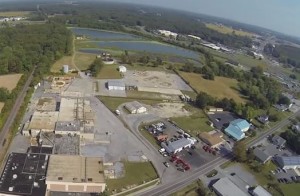
BERLIN – Town officials agreed this week to enter the bond market to fund the purchase and the start of redevelopment of the former Tyson plant property.
The Berlin Town Council voted 4-0 this week to issue and sell general obligation bonds in the amount of $3 million. The move is expected to provide the town with $2.5 million to purchase the property and $500,000 to start work on the site. Though a formal plan for the property has yet to be decided upon, a variety of public uses — including a skateboard park and swimming pool — are being considered.
“This is a property we’re taking from the outhouse to the penthouse in terms of its value to the community,” Mayor Gee Williams said.
By entering the bond market now, town officials are expecting to go to settlement on the property, which is currently owned by Berlin Properties North, in February.
The town has already hired consulting firm EDSA to explore potential uses for the property and is expecting a report on the subject any day now. The company is expected to help town officials narrow down the roughly 30 suggestions for the property that came up earlier this year during the town’s strategic planning sessions.
Williams said the consulting firm would provide a variety of different templates for the property. Town officials will choose the development path they expect to be most successful and will pursue it with the help of area non-profits and private enterprises.
“It will be a mix,” Williams said. “It is what has worked in other places. It’s what we can afford to do.”
He added that the income stream created by whatever the property is used for will help pay off the 30-year bond.
“The whole thing is it has to be self-sustaining financially,” he said. “Does that mean we’re going to be able to make everybody happy? No.”
Williams stressed that the redevelopment of the plant would only be achieved with community input and support. One of the town’s goals in this project and future projects, however, will be accessibility. According to Williams, the days of having to get in a vehicle to go anywhere are gone.
“Our goal is to make sure every neighborhood has amenities that are appropriate and meaningful,” Williams said, “and every time you want to do something you don’t have to get in an automobile to get there.”
Resident Zack Tyndall asked Williams how the bond would be repaid if the property failed to generate the necessary revenue.
“I want to make sure town’s in a nice position and the property can be used for something that’s great and not going to incur more debt,” Tyndall said.
He said he was concerned that residents could be left with increased taxes as a result.
“If we’re that damn incompetent, that’s what will happen,” Williams replied, adding that the town would simply have to pick a mix of projects for the property that would be profitable. “The days when this town was constantly on the brink of ‘how are we going to pay next month’s bills’ is a part of our history.”
Council member Lisa Hall reminded those at Monday’s meeting that by purchasing the former chicken plant, the town would be able to prevent the property from returning to an industrial use. She said residents had forgotten about the heavy trucks that had traveled through town to the plant and the smell that permeated the area.
“There was a heavy odor from that plant,” she said.
Hall also assured residents that the town would not have pursued the substantial purchase if it were not in the financial position to do so.
“I just want the public to know we’re not buying this plant to hurt the town financially,” she said.
According to Hall, the town will be able to pursue a number of grants from a variety of agencies when it comes to redevelopment.
“There’s a lot of money available for sustainable grants,” she said, “for taking an eyesore and turning it into something that can be used by the whole community.”
Resident Jason Walter said he was glad to hear Hall’s mention of potential grants but was still concerned that the property would not be able to support itself.
“The revenues you generate from fees and uses may cover operating costs but will not touch acquisition or development,” he said.
Williams pointed out the town had been very successful in getting grants in recent years, most notably for its wastewater treatment plant, and planned to continue that trend.
“Most communities go to their potential grant partners and say we need ‘xyz’,” he said. “They’re holding out an empty hand. When we go to our partners … we go with as much as we can scrape up.”
The $500,000 “seed money” that will be left after $2.5 million goes to Berlin Properties North will help with that. Of course, it could also be used to benefit the project in a number of other ways, as the ordinance authorizing the bond sale labels potential uses as environmental remediation, acquiring nearby properties or undertaking related activities.
In an interview Wednesday, Williams said that wording had been included so the town would have plenty of flexibility in how the bond proceeds could be used. He said town officials were already thinking about dedicating an employee — who will need an office — to the Tyson property.
“It’s a major enterprise with a lot of moving parts,” he said.
He doesn’t envision an entire staff but does believe an employee or two will need to have a base of operations, “on site to actually manage the property.”
He said that could involve buying a nearby property if it was necessary.
“If we need to upgrade something on the property or immediately adjacent, it gives us the option,” Williams said.

